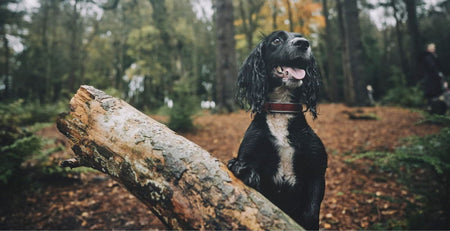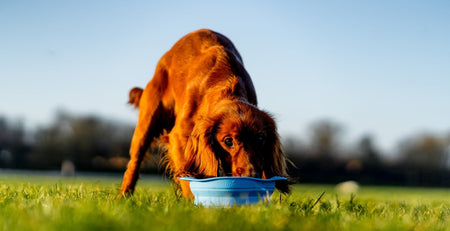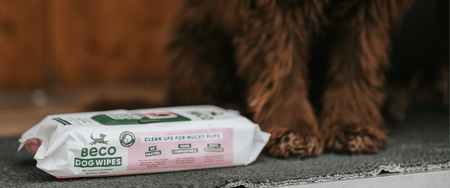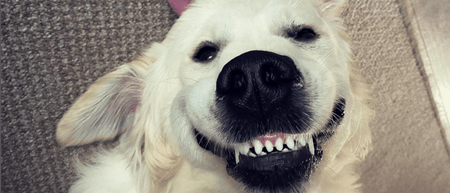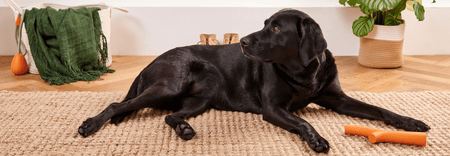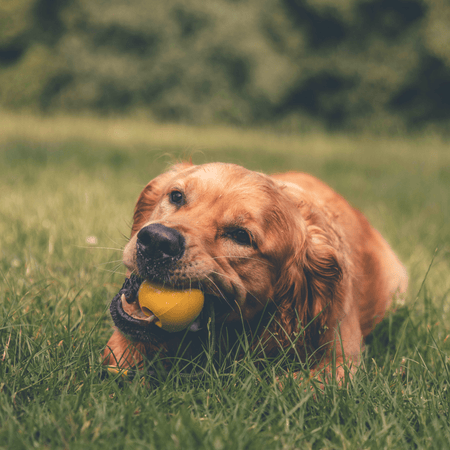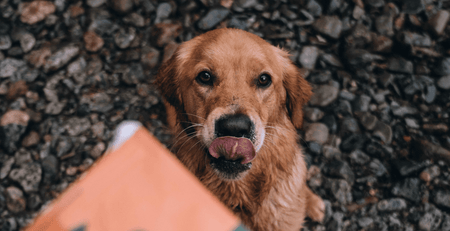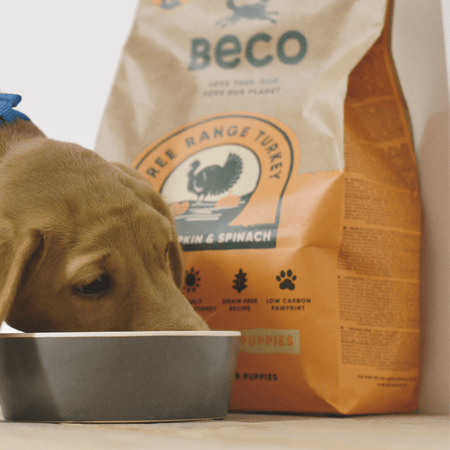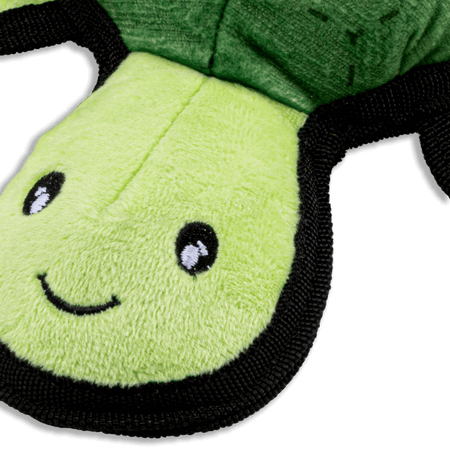Bringing home a new puppy is an exciting and joyful experience. From their adorable wagging tails to their innocent eyes, puppies can quickly steal our hearts but it also requires dedication, patience, and some pup knowledge.
Don’t know where to start? Don’t worry! From puppy-proofing your home, to balanced diets and consistent routines, we’ve got a comprehensive guide with the top 10 essential new puppy tips, as well as what to avoid, that will help you navigate the early stages of puppyhood!
Key Summary
Building a strong bond with your new puppy is essential for a harmonious relationship.
Your new puppy journey will require patience and consistency, as well as plenty of positive reinforcement in the form of treats, rewards and praise.
Some tips for helping a new puppy to settle in include providing the correct puppy food, training your new pet and prioritising their vet check ups.
Avoid using physical punishments to discipline your puppy as this can create anxiety; instead, focus on positive reinforcement.
Getting to Know Your Puppy: Building a Bond

Bringing a new puppy into your home is a moment of anticipation and excitement and one of the most important aspects of this journey is building a strong bond from the offset. It’s true what they say, dogs are a human’s best friend, and there are a few ways to ensure you get off to the best start possible.
Spending Quality Time Together
First and foremost, spend quality time together by engaging in activities that allow you to interact, such as playtime and petting, as well as plenty of cuddles! Pay attention to their body language and observe how they respond to different activities and levels of affection as, just like us, every puppy has their own preferences, likes and dislikes.
Take note of what makes their tail wag, the toys they enjoy, and how they communicate their needs to you. If they don’t like what you are doing, or have had enough, they’ll be sure to let you know! Your puppy is likely to be in various social situations over time, and once they are settled, observe how they behave in different situations, such as when exposed to new people, other animals, and various environments. Understanding their temperament, from shy to energetic, will give you a greater understanding of how you need to tailor your training and every day interactions.
The Importance of Establishing a Routine
Routine is something you will repeatedly come across when looking into how to take care of a puppy; it is super important to get this in place as early as possible. Puppies thrive on structure and consistency so establish a daily routine that works for you both, for feeding, playtime, exercise, and rest as this will help to create a sense of security but also helps you to anticipate their needs.
Puppies respond well to rewards, praise, and encouragement so be sure to use positive reinforcements to praise them. Using treats, verbal cues, and gentle touches can help to reinforce good puppy behaviour which is great for training, but also that all important bond you’ll want to create.
Have Patience!
Finally, one of the most important traits a new puppy can have is patience and giving your new furry friend time to adjust to their new surroundings, as well as their owner. When looking after puppies, it is important to give them time to adapt to the learning process. Remember, each puppy is unique and will go at their own pace!
10 Tips | Taking Care of a Puppy
1. Puppy-Proof Your Home: Creating a Safe Haven
Before getting a puppy and bringing them home, it's crucial to get your living space prepared for their comfort and safety. Puppies are notoriously curious creatures who are prone to exploring their surroundings (thoroughly) with their nose and mouth. Here are some puppy-proofing tips to keep in mind:
Remove any toxic substances or plants that could be within reach.
Secure electrical cords and cables to prevent chewing hazards.
Store cleaning supplies, medications, and other potentially harmful substances out of their reach.
Keep small objects and children's toys off the floor to avoid choking hazards.
Consider using baby gates or closing off certain areas to limit their access.
2. Set Up Proper Sleeping Arrangements
Just like humans, puppies need a designated and comfortable sleeping space, with proper sleeping arrangements promoting a restful sleep and helping establish a routine. Give your dog a bed or crate specifically designed for puppies and place it in an area where your new pet will feel safe and secure. We’d recommend a quiet part of the room.
As tempting as it is to give your new bundle of fluff a spot in your own bed, it is best to encourage them to sleep in their own bed to prevent any long-term sleeping arrangement issues.
3. Fueling your Puppy’s Growth
Much like us, puppies need a nutrient rich diet for healthy development. Selecting a high quality puppy food is essential to ensure that they are getting the right vitamins and nutrients. Proper nutrition is crucial for the healthy development of your new puppy. Selecting high-quality puppy food is essential to provide them with the necessary nutrients.
Puppy-specific food is necessary as it has been specifically formulated to meet the dietary needs of growing dogs. Your pup may be used to a specific food from the breeder or shelter they have come from and if you wish to change it, you should make a gradual transition to the new type to avoid an upset stomach!
We would always recommend avoiding feeding your dog from the table or sharing your food as this can lead to nutritional imbalances and bad behaviours. If you’re unsure what food would be best suited to your pooch, speak with your vet who can advise on types and portion sizes.
4. Establish a Consistent Routine
Puppies thrive on routine and predictability and through the introduction of a consistent daily schedule, you can help your pup feel more secure and it can encourage obedience. Here’s some tips for setting a routine for your puppy:
Set specific times for meals, walks, playtime and bathroom breaks.
Establish regular sleeping and waking hours to help regulate their internal clock.
Use positive reinforcement to reward good behaviour and be consistent in enforcing rules.
Gradually introduce new experiences and environments to help with socialising.
5. Prioritise Your Dog’s Social Life
Socialisation is a crucial aspect of raising a well-rounded and confident puppy so get some dates in the diary to expose your pup to various people, animals and environments from an early age. An active social life will allow your puppy to develop important social skills.
Starting from around 8-13 weeks is ideal as this is when puppies will be most receptive, but be sure to wait until your pup is vaccinated and that any other animals they meet are also vaccinated.
Gradual introductions to different places, animals, and people are best to avoid overwhelming or stressing out your dog, and be sure to use praise and rewards so your dog associates the experience with positivity.
6. Positive Training Experiences
Training your puppy is a fundamental part of their development and ensures their safety and good behaviour. Positive reinforcement-based training methods are highly effective and help strengthen the bond between you and your puppy.
𝐢 A study published in a 2017 Volume of the Journal of Veterinary Behavior, titled The effects of using aversive training methods in dogs – A review, reviewed numerous studies on the effects of various dog training methods. The review found that “using aversive training methods (eg. positive punishment and negative reinforcement) can jeopardize both the physical and mental health of dogs”.
We would recommend using rewards, treats and praise as well as playtime to motivate your puppy and reinforce the desired behaviours. Focus on basic commands such as “sit”, “stay” and “come”, before moving on to anything more advanced.
Being patient and consistent are key to successful training but if you are struggling, it may be worth seeking guidance from an obedience school or dog trainer.
7. Regular Check-ups and Vaccinations
Maintaining your puppy's health is vital for their overall well-being so it is always best to keep up to date with vet check ups and vaccinations as this will help to prevent illnesses and health checks.
𝐢 You should also discuss spaying and neutering options with your vet to prevent unwanted pregnancies. Always keep an eye on any changes in your pet pup and consult your vet with concerning symptoms.
Want unlimited vet advice without paying and travelling for an appointment? With Waggel Pet Insurance, you’ll get access to 24/7 free televet services with Joii. This means there’s no need to visit a vet in person, you can chat with one in the privacy of your own home via video chat. Joii vets can also recommend over-the-counter medication which you can purchase through the app making it easy to get answers to all your questions.
8. Play and Exercise

Puppies have boundless energy and require both mental and physical stimulation to prevent boredom and encourage healthy development. Some of the best ways to keep your puppy entertained and stimulated include:
Engaging in interactive play sessions using toys specifically designed for puppies.
Offering puzzle toys or treat-dispensing toys to keep their minds active and challenged.
Taking your puppy for daily walks, gradually increasing the duration and intensity as they grow.
Incorporating training sessions into playtime to keep their minds sharp and reinforce commands.
9. Avoid Common Pitfalls: What Not To Do with a Puppy
As a responsible puppy owner, it's essential to be aware of common pitfalls and avoid potential mistakes. Here are some key "what not to do" tips:
Do not mistreat or resort to physical punishment as a means of discipline as this can cause fear and anxiety in your puppy, damaging the trust and bond built.
Avoid feeding your puppy human foods that can be harmful or lead to nutritional imbalances. Some foods such as grapes and chocolate are toxic for dogs.
Refrain from isolating your puppy for extended periods; they thrive on companionship and social interaction. Restricting socialisation can cause anxiety and distress.
Do not expect your puppy to understand complex sentences or commands; keep training cues clear and simple.
Do not leave young children unsupervised with the puppy, as accidents can occur.
Do not neglect your puppy’s physical stimulation or walks.
10. Bedtime
The night time can be challenging when you first bring your puppy home, especially the first 48 hours, but with proper care, you can establish a routine that promotes restful sleep for both of you. Consider the following tips for bedtime when you have got a puppy to take care of:
Set a consistent bedtime and wake-up time for your puppy to regulate their sleep schedule.
Provide a comfortable and secure sleeping area, such as a crate or a designated puppy bed.
Consider keeping your puppy's sleeping area in your bedroom during the first few nights to provide comfort and reassurance.
Take your puppy out for a final bathroom break before bedtime to prevent accidents during the night.
Use comforting scents, such as a blanket or toy with the scent of their littermates, to help your puppy feel secure.
Frequently Asked Questions (FAQs)
How Often Should I Bathe My Puppy?
The frequency of bathing your puppy depends on their breed, activity level, and individual needs. Generally, it's recommended to bathe puppies every 2 to 3 months or as needed. Over-bathing can strip their coat of essential oils, so it's important to strike a balance and use mild, puppy-specific shampoos.
How Can I Prevent My Puppy from Chewing on Everything?
Puppies explore the world with their mouths, and chewing is a natural behaviour. To prevent destructive chewing, provide plenty of appropriate chew toys and supervise your puppy when they are exploring new areas. Additionally, puppy-proof your home by removing potential hazards and keep valuable or dangerous items out of reach.
Can I Leave My Puppy Alone at Home?
Puppies should not be left alone for extended periods, especially in the early months. They require companionship, mental stimulation, and bathroom breaks. If you need to leave your puppy, consider doggy daycare, hiring a dog sitter, or arranging for a trusted friend or family member to provide company and care.
How Can I Prevent My Puppy from Biting or Nipping?
Puppies explore their environment through mouthing and biting, but it's important to discourage inappropriate biting behaviours. Provide appropriate chew toys, redirect their attention when they nip, and use positive reinforcement to reward gentle and appropriate behaviour. Consistent training and patience are key in teaching bite inhibition.
When Should I Switch My Puppy to Adult Dog Food?
The timing of switching to adult dog food varies depending on your puppy's breed and size. Small to medium-sized breeds can usually transition to adult food between 9 and 12 months, while large breed puppies may benefit from staying on puppy food until they reach 1 to 2 years of age. Consult your veterinarian for specific guidance.
Final Thoughts
Welcoming a new puppy is an adventure filled journey that offers fun and joy, but also plenty of responsibility. Following our top 10 new puppy tips provides you with a solid foundation for your puppy's growth and well-being.
From puppy proofing your home, to training and health care every aspect is important for your new pooch’s development. Remember, a puppy's journey is a lifelong commitment, and with your dedication, patience, and love, you will create a strong and lasting bond with your furry friend. Check out our collection of puppy products, here!

